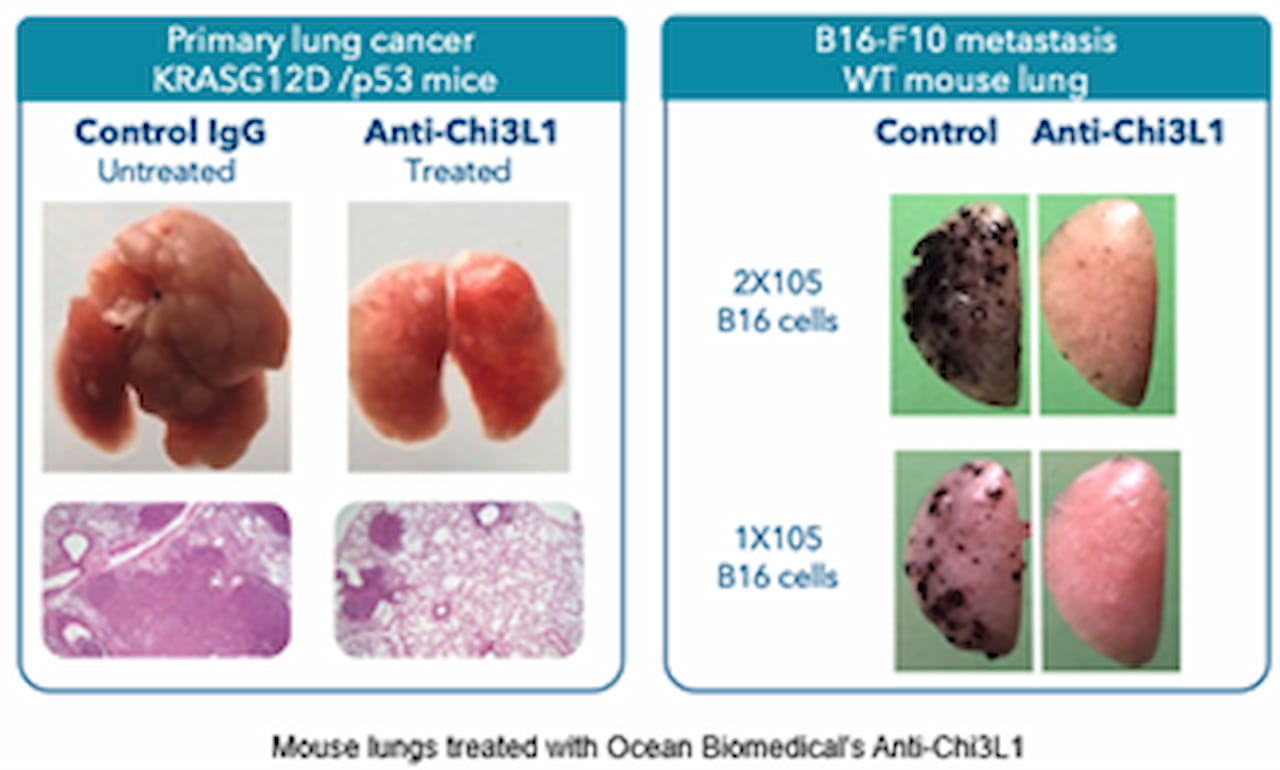Biopharmaceutical company Ocean Biomedical, Inc. (NASDAQ: OCEA) provided details of its multi-pronged lung cancer program built on novel immunotherapy discoveries by the company’s scientific co-founder Dr. Jack Elias. The report comes on August 1, which is observed as World Lung Cancer Day.
Studies conducted by Dr. Elias and his team showed that Chitinase 3-like-1 (CHi3L1) is a master regulator that inhibits antitumor immune responses. The company’s lung cancer program is advancing multiple approaches to reversing immune system suppression caused by CHi3L1 alone and in combination with other immunotherapy pathways.
Dr. Chirinjeev Kathuria, Ocean Biomedical’s co-founder and executive chairman, said, “Non-Small Cell Lung Cancer alone affects nearly 500,000 people in the U.S. These discoveries have the potential to save thousands of lives of people affected not just by lung metastasis, and glioblastoma, but also other forms of cancer such as breast, prostate, and melanoma.”
It has been found that the programs suppress primary and metastatic tumor growth in multiple animal models and have potential use in multiple forms of visceral cancers. They have demonstrated up to 95% reduction in primary and metastatic tumor burden in mouse models of lung cancer.
“We are making discoveries that we believe will drive cancer research, and eventually treatment and patient outcomes, forward. This pathway discovery is an unprecedented leap, because if you control CHi3L1, you don’t just control one anti-cancer pathway, you simultaneously control many anti-cancer pathways,” said Dr. Elias.
Ocean Biomedical is a biopharmaceutical company that partners with scientists, research universities, and medical centers for developing and commercializing their discoveries. Currently, it is working to develop five promising discoveries that have the potential to achieve life-changing outcomes in lung cancer, brain cancer, pulmonary fibrosis, and the prevention and treatment of malaria.
“On World Lung Cancer Day, we are proud to be part of the global effort to cure this terrible disease. We are working on the systematic steps needed to progress the anti-CHi3L1 antibodies into the clinic to potentially become impactful new cancer therapeutics,” commented the company’s CEO Elizabeth Ng.
Anti-CHi3L1 Monoclonal Immunotherapy
Ocean Biomedical’s tumor reduction approach includes anti-CHi3L1 monoclonal immunotherapy, the first step of which has stemmed from effectively reversing immune system suppression through binding CHi3L1 polypeptides with the company’s proprietary immunoglobulin antibody. The monoclonal approach has yielded a significant reduction in mouse lung tumor burden similar to current, cutting-edge monoclonal therapeutics, creating the possibility of a new cancer immunotherapy option for patients who have poor response to existing treatments.
The company’s monoclonal antibody targeting CHi3L1 received a U.S. patent in June 2023 for both application in lung cancer and potential application in prostate cancer, colon cancer, rectal cancer, ovarian cancer, kidney cancer, breast cancer, glioblastoma, and melanoma.
Multiple Bispecific Immunotherapy Pathways
Building on the monoclonal antibody approach, the company is developing groundbreaking bispecific antibodies that target CHi3L1 in combination with other known suppressors of tumor growth and development. This approach results in the simultaneous targeting of several major cancer pathways. Each bispecific candidate has been shown to substantially multiply effectiveness compared to current, established mono-focused immuno-therapeutics.
The company is working to create a new generation of cancer therapeutics. In separate new approaches targeting PD1 and CTLA4, each in combination with anti-CHi3L1, its bispecific therapeutic candidates have created lung cancer tumor suppression of 85%–95%. Both bispecific approaches have pending patents in the U.S. and internationally, with claims extending beyond lung cancer to potential use in multiple additional cancers, including glioblastoma multiforme.
Anti-CHi3L1+Anti-PD1 Bispecific Immunotherapy
One of the currently effective cancer immunotherapies targets Programmed Cell Death Receptors, often designated ‘PD1’ and its ligand ‘PDL1.’ In the results of one study testing the efficacy of the monospecific and bispecific antibodies by culturing tumor cells and human T lymphocyte cells together in the presence of varying combinations of Ocean’s antibodies, anti-PD1 caused the T cells to kill approximately 20% of the tumor cells and Ocean’s monospecific anti-CHi3L1 was comparably effective.
When the two monospecific antibodies — anti-CHi3L1 and anti-PD1 — were administered individually and at the same time an additive effect was seen with 40% of the tumor cells being killed. Pushing a step further, when Dr. Elias’ team tested the bispecific antibody that targeted CHi3L1 and PD1 greater than 90% of the tumor cells were killed.
Anti-CHi3L1+Anti-CTLA4 Bispecific Immunotherapy
Ocean Biomedical is also targeting the immune checkpoint inhibitor CTLA4, another established immunotherapy pathway. The efficacy of these monospecific and bispecific antibodies has been tested in mouse model experiments, where malignant melanoma tumor cells are released into the mouse circulation and their ability to spread to the lung is evaluated by quantitating the black pleural tumor colonies that develop in the presence of varying combinations of Ocean’s antibodies.
Multiple Pathways, Multiple Cancers
On several fronts, Ocean Biomedical is advancing lung cancer treatment candidates that have the ability to target multiple tumor-suppressing pathways at the same time, and early indications show potential for multiplying the effectiveness of current immuno-oncology products, generating surprising, synergistic outcomes. Because these candidates are building on evolving understanding of how cancer cells subvert and attenuate natural immune responses, each candidate has potential application against a broad range of cancers.
